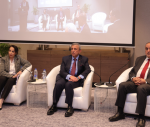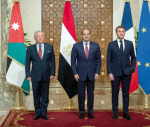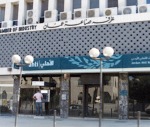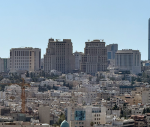You are here
'No progress' in discussions with Iran — UN nuclear watchdog
By AFP - Nov 10,2022 - Last updated at Nov 10,2022
VIENNA — The UN nuclear watchdog said on Thursday it had seen no progress in discussions with Iran over undeclared nuclear material at three sites, but a new visit to Tehran was planned this month.
The issue has been a point of contention during on-off talks between Tehran and world powers to revive a 2015 landmark deal that sought to curb Iran's nuclear programme in exchange for sanctions relief.
"The director general[Rafael Grossi] is seriously concerned that there has still been no progress in clarifying and resolving the outstanding safeguards issues," the International Atomic Energy Agency (IAEA) said in a report seen by AFP.
Senior agency officials will conduct a technical visit to Tehran before the end of November, the report added.
"The agency has reiterated that at this meeting, it expects to start receiving from Iran technically credible explanations on these issues, including access to locations and material, as well as taking the samples as appropriate," it added.
The director general “reiterates that these issues... need to be resolved for the agency to be in a position to provide assurance that Iran’s nuclear programme is exclusively peaceful”, it added.
In an interview with AFP on Thursday on the sidelines of the COP27 climate summit in Egypt, Grossi said in meetings with Iranian officials the IAEA had been “trying to help them focus their answers so that we can have something in our hands”.
The UN watchdog has been pressing Iran to give answers on the presence of nuclear material at three undeclared sites, a key sticking point that led to a resolution criticising Iran being passed at a June meeting of the IAEA’s board of governors.
The board’s next regular meeting takes place next week, with the IAEA’s reports on Iran being discussed as usual.
Increase in highly enriched uranium
In a separate report seen by AFP, the IAEA said Iran’s stockpile of enriched uranium stood at 3,673.7 kilogrammes as of October 22, a decrease of 267.2 kilogrammes from the last quarterly report.
The decrease of the overall stockpile is, however, in part due to an increase of the stockpile of highly enriched uranium since that requires more material.
The stockpile of uranium enriched to 60 per cent is now at 62.3 kilogrammes, up from 55.6 kilogrammes.
That level of enrichment is much closer to the 90-per cent threshold required for use in a weapon.
Iran now also has 386.4 kilogrammes of uranium enriched up to 20 per cent, up from 331.9 kilogrammes in the last September report.
At this level uranium can be used to produce isotopes for medical uses, for example in diagnosing certain cancers.
Iran, which insists it is not striving to have a nuclear bomb, has continued enriching uranium to levels well above the 3.67-per cent limit in the 2015 deal.
The IAEA has also repeatedly warned it has lost its ability to fully monitor Iran’s programme since the Islamic republic started to restrict its access last year.
“Any future baseline for the... verification and monitoring activities would take a considerable time to establish and would have a degree of uncertainty. The longer the current situation persists, the greater such uncertainty becomes,” the agency said.
Talks have been under way since April last year to revive the 2015 nuclear deal, which started to unravel when the United States withdrew from it in 2018.
US Secretary of State Antony Blinken late last month reiterated that he saw little scope to restore the deal, pointing to the clerical leadership’s conditions, as major protests roil the country.
Related Articles
VIENNA — Iran has again boosted its stock of highly enriched uranium, the UN's nuclear watchdog reported on Wednesday, just days ahead of an
VIENNA — The UN nuclear watchdog on Monday voiced concern that Iran had not clarified queries over possible undeclared nuclear activity, add
TEHRAN — Iran condemned as "not fair" Tuesday a report by the UN nuclear watchdog on traces of nuclear material found at three undeclared si

Opinion
Apr 07, 2025
Apr 07, 2025
Apr 07, 2025
Apr 06, 2025
- Popular
- Rated
- Commented
Apr 07, 2025
Apr 07, 2025
Apr 07, 2025
Newsletter
Get top stories and blog posts emailed to you each day.















